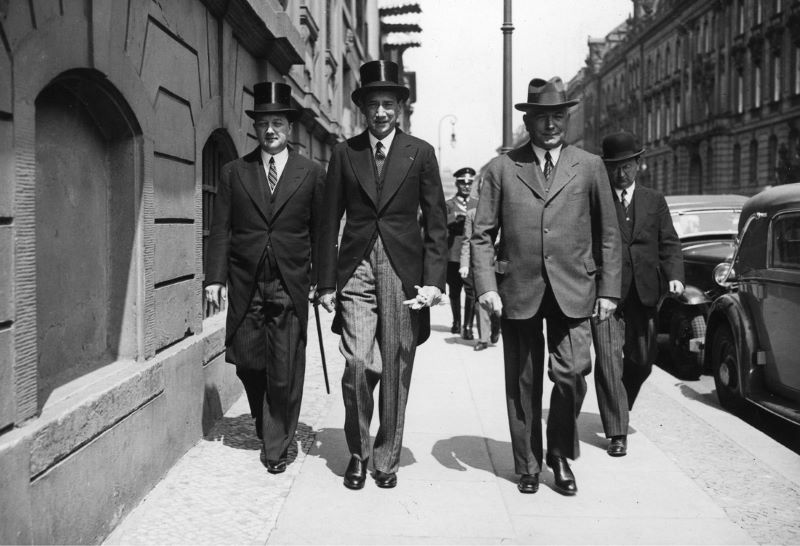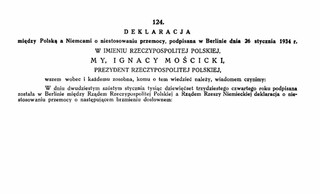 J.Beck's official visit in Berlin, July 1935, from the left: ambassador J.Lipski, Polish minister of foreign affars Jozef Beck and his German counterpart K. von Neurath. Source - National Digital Archives of Poland
J.Beck's official visit in Berlin, July 1935, from the left: ambassador J.Lipski, Polish minister of foreign affars Jozef Beck and his German counterpart K. von Neurath. Source - National Digital Archives of Poland
When during the World War II, Jozef Lipski, aged 45, found himself at the French front fighting in a rank of a private, his comrades did not want to believe that they had a former ambassador of Poland to Germany standing in front of them. The story of Jozef Lipski resembles the stories of other prominent Polish politicians of the interwar era, who, disgraced after the defeat in September 1939, and outcasted from politics, were forced to leave the country.
Lipski came from an aristocratic family from Wielkopolska. After Poland regained its independence in 1918, he quickly found his place at the Polish Ministry of Foreign Affairs. Due to his aristocratic roots, knowledge of foreign languages, Lipski rapidly climbed the ladder of diplomacy. In the 1920s and 1930s, he was a secretary of the Polish diplomacy missions to France, UK and ultimately Germany. When Hitler became a chancellor in 1933, Lipski was appointed as the Polish Ambassador to Germany. The appointment was considered a milestone towards stabilization of Polish - German relations.
Józef Lipski co-created the policy of balance, a political concept aimed to maintain a balance of power between Poland, Germany, and the Soviet Union. The goal was to secure Poland's borders at the time when both Communist Russia and Germany were rising in power and prevent the countries from becoming too dominant in the region.
The polish-german diplomatic relations had worsened after the “anschluss” of Austria and the Munich Agreement. In 1938 Joach von Ribbentrop officially repeated German demands to annex Gdansk/Danzig( a Free City at that time) and creation of the Pomeranian Corridor, linking the Reich with Eastern Prussia. Lipski saw those aggressive demands as a clear notice that the war with Nazi Germany was imminent and inevitable. His foresight was ignored by the government in Warsaw, and the rest is history. First page from Polish-German non-agression declaration from 1934.
First page from Polish-German non-agression declaration from 1934.
With the outbreak of war, he left Germany and returned to Poland through Denmark, Sweden and Latvia. Few days later, after the Soviets invasion of Poland, on September 18th Lipski had crossed the Romanian border. The war fate threw him to France, when he ended up fighting Germans on Maginot Lane in 1940. Lipski amazed everyone and instead of pursuing his diplomatic service, despite his mature age, he joined the newly-formed Polish army and at the beginning fought in the rank of a private. After France’s defeat, Jozef Lipski had gone to London and got involved with the Polish government in exile. After the end of the war, he emigrated to the USA.
Our collection of the Polish Ambassadors' memoirs reflect on Poland’s foreign policy in the eve of World War II outbreak. The documents from the interwar era (1919-1939) - provide Polish diplomacy's perspective at the time when war with the Third Reich was imminent.
Collection of Józef Lipski (1894-1958), a Polish Ambassador to Berlin between 1934-1939, consists of documents written in: Polish, German, French and English. The documents include secret correspondence between the Polish Embassy and the Ministry of Foreign Affairs in Warsaw. Additionally, they contain Ambassador’s notes reflecting on Hilter’s rise in power and political climate in Germany. Considering the subsequent developments and paths of history, Lipski’s secret reports to the Polish Secretary of Foreign Affairs, Jozef Beck, are fascinating history lessons. Please take a look at the Jozef Lipski Collection from the Pilsudski Institute of America.










